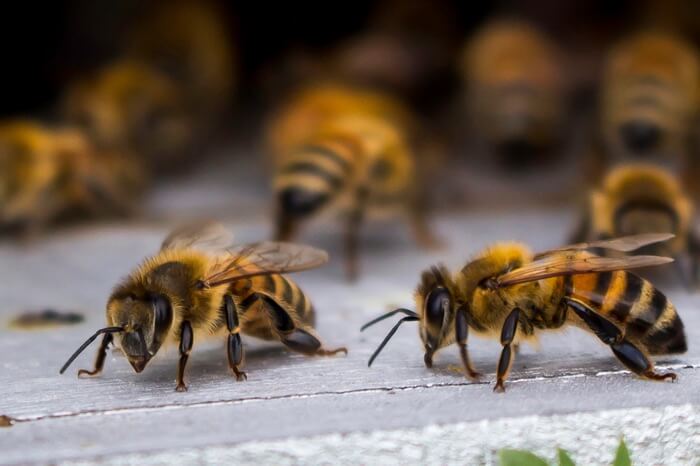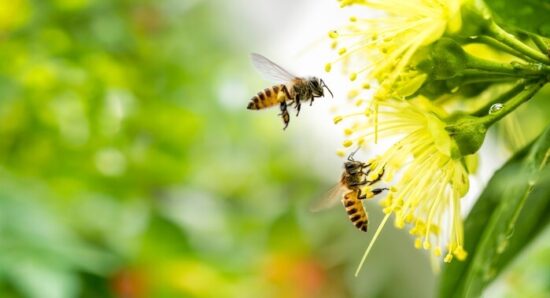Using essential oils to repel bees is an extremely effective method that many people overlook. These oils are potent, easy to use, and eco-friendly.
This list of the most powerful essential oil bee repellents will give you plenty of new options when it comes to keeping bees away.
1. Rosemary
Rosemary is a flavorful herb that offers a distinct scent and aroma. Most common in French, Italian, and Spanish cooking, rosemary is anything but subtle. Essential oils derived from this herb are intense and unmistakable.
Take one whiff of rosemary oil, and it’s no surprise that this can be used as an essential oil to repel bees! The smell can be overwhelming for the insect’s sensitive olfactory glands. Even a drop of it will drive any bee in the vicinity away.
Whether you use its oil as part of a topical spray or yard repellent, it’s potent enough to get the job done.
The best part? It’s not just an essential oil to keep bees away. Rosemary oil works also repel everything from mosquitos to cabbage moths! As a result, the oil is versatile enough to help in your vegetable garden, landscaping flowers, and backyard hangout space.
2. Tea Tree
Tea tree oil is one of the more popular essential oils. With a long history of medicinal use, the oil is a must-have in any oil lover’s collection.
This one is a bit more subtle than other options. It has a pleasant woodsy scent that’s easy on the nose. You don’t have to worry about overpowering smells when you use it.
That said, the aroma of this essential oil makes it a powerful bee repellent. Most will avoid it like other pests.
Curiously, tea tree oil does have some solvent-like properties. When applied directly to a bug, it dissolves the exoskeleton’s waxy cuticle. Not only does this make the bug more vulnerable to harm, but the oil can seep into the insect’s respiration holes to suffocate them.
Quick Tip: Exercise caution when using tea tree oil as an essential oil to repel bees, as you could inadvertently harm the bees rather than keep them away.
3. Eucalyptus
Here’s another oil that has a solid reputation and a wide variety of use. In addition to being a great essential oil bee repellent, many like to utilize eucalyptus oil to soothe joints, clear sinus clogs, and more.
The oil comes from the oval-shaped leaves of the eucalyptus tree. It’s fragrant and contains a sharp citrus smell that bees can’t stand.
The magic in this oil comes from the citronella compound. Like other citrus-like smells, it’s far too overwhelming for bees, wasps, and other insects. Eucalyptus oil also has a compound that acts as a biomedical pesticide.
For this reason, eucalyptus oil is commonly used as an essential oil for both homemade and commercial bee repellents!
Raw eucalyptus oil works well to keep bees away and provide the flexibility you need to apply it how you want.
4. Clove Oil
Also known as eugenol, clove oil is a multipurpose substance with a ton of excellent properties. It comes from the flower buds of the clove tree, which grows in Southeast Asia. Used for everything from cooking to traditional medicine, clove oil has a lot to offer.
First and foremost, this essential oil for repelling bees has an undeniably strong smell. It’s certainly something that takes getting used to, but the aroma is anything but offensive to humans. For many, the distinct fragrance conjures up thoughts of holiday mornings and festive tidings!
Either way, this essential oil can keep bees away rather effectively.
Clove oil also has natural herbicidal, fungicidal, and insecticidal properties. As a result, you’ll see farmers and gardeners use it all the time on plants.
Despite its potent effects, clove oil has low toxin levels. Plus, the oil breaks down relatively quickly into agriculture-safe organic matter.
5. Citrus
You can’t go wrong with citrus-based essential oils for bee repellent. Citrus oils have a signature smell that’s instantly identifiable to most. It’s somewhat sour and can overwhelm the senses if it gets too close to your nose!
Bees have a similar response to citrus scents. But, they don’t need much of it to experience discomfort. Even diluted forms of this essential oil will keep bees away and force them to look elsewhere for pollen.
There are many different kinds of citrus-based essential oils you can use to repel bees. Some of the more popular options include:
- Citronella oil
- Lemon oil
- Lemongrass oil
- Grapefruit oil
- Wild orange oil
- Lime oil
Any of those essential oils will work to repel bees. But what’s the magic ingredient? It all comes down to the citronella compound that gives the oil its distinct citrus aroma.
The compound is something that most bees naturally avoid. It’s overwhelming on the senses. Not only that, but citronella reportedly masks the human-based scents.
Quick Tip: That’s why citrus is so effective against mosquitos and other biting pests as well. While most bees are more likely to fly away than sting you unprovoked, the smell that citrus oils leave behind is more than enough to keep them out of the area.
6. Peppermint
Peppermint might be lovely and refreshing for us humans, but bees will actively avoid the smell as much as possible. It’s a common irritant that assaults the senses of many bugs. Many attribute its effectiveness down to the menthol content, which wreaks havoc on those trusty olfactory glands.
Peppermint oil isn’t the only menthol-based solution out there. Standard mint, spearmint, pennyroyal, and more do the trick, too. That said, peppermint has the highest menthol content and offers the most potent smell.
The best way to utilize peppermint oil as an essential oil to repel bees is by simply dispersing the aroma as wide as you can. Whether that’s through spray mixtures or live plants is up to you. The smell this oil produces has a naturally far spread.
Allowing it to waft throughout your backyard or home essentially turns it into a bee-free zone.
7. Cedarwood
If you enjoy woodsy smells, cedarwood oil might be the best essential oil bee repellent for you. The scent is distinctly homey, bringing up thoughts of a remote winter cabin. It’s pretty pleasant and acts as a viable alternative for those who don’t want sweet-smelling fragrances to follow them around.
Cedarwood oil is frequently used for many forms of pest mitigation. The wood’s oil contains natural acids and aromatic hydrocarbons. Without getting too deep into the scientific details, the oil releases natural chemicals with many of the same effects as an organic pesticide.
That’s why you see cedar so much in closets. It keeps bugs off your precious garment collection!
You can take advantage of those same repellent properties to keep bees away. They hate the smell and know how to spot potentially lethal markers just like moths.
8. Geranium
As its name would imply, this oil comes from the geranium plant. Known for its fragrant and colorful flowers, this plant produces very potent essential oils.
Unlike other options, you don’t have to go overboard when using geranium as an essential oil to get rid of bees. There’s no need to soak plant leaves or douse yourself in a high-concentration mixture to repel bees. A little goes a long way.
Furthermore, geranium oil lasts significantly longer than most oils. It still requires reapplication to maintain protective benefits. However, the substance takes longer to evaporate, giving you plenty of time to experience the perks between applications.
9. Citronella
Lastly, we have pure citronella oil. Many different essential oils have citronella compounds, such as citrus-based solutions and geranium. However, citronella oil is the most potent.
This oil comes from a plant grass called Cymbopogon. It’s very potent, making essential oil a common ingredient in commercial repellent products. It’s in everything from candles to incense-like smoke spirals.
As you burn those products off, the oil becomes more potent and effective than before. Usually, you’ll see it marketed as a mosquito deterrent.
While it certainly works on those pesky bloodsuckers, it’s also a good essential oil for repelling bees!
Citronella oil isn’t as long-lasting as something like geranium. It evaporates relatively quickly, calling for more frequent applications. That said, the results it provides are well worth the trouble.
The Advantage Of Using Essential Oils To Repel Bees
There are some distinct advantages that come from using essential oils to repel bees. While some people would automatically resort to hive removal or chemical-based pesticides, essential oils can do the trick in a much more humane and eco-friendly way.

You see, bees are ecologically necessary. They’re robust pollinators that play a big part in helping plants thrive.
Unfortunately, bee populations are on the decline. Actively trying to kill these bugs isn’t going to do our troubled Earth any favors!
Essential oils are a fantastic way to repel bees and control where they go. It keeps them out of the areas you want to enjoy, but it doesn’t kill them outright. The bees are still free to roam and work their magic on plants. With help from essential oils, you’re simply creating boundaries!
Another major perk of using essential oil bee repellent is the safety factor. Chemical pesticides are full of harsh chemicals that can damage plants, harm your respiratory system, and even cause allergic reactions. With essential oils, none of those issues exist.
The oils are all-natural, making them safe enough to apply anywhere. You can spray them onto plants, in your home, and even on your own skin with proper preparation.
Different Ways To Use Them
Versatility is the best part of utilizing essential oils to keep bees away. Think of these oils as the main ingredient in your bee-repelling efforts. How you use the element depends on your unique needs.
Not sure where to start? Give these application methods a try!
On Skin Or Clothing
If you’re not interested in treating your entire yard, consider making yourself a walking bee repellent! Essential oils are frequently used in perfumes and cosmetic products. They’re safe to use with careful preparation and emit the same level of fragrance to keep bees off of you.
Now, you must do some work beforehand before you start lathering the oil onto your skin. You should never apply essential oils onto your skin without diluting it first. To do that, use a carrier oil like grapeseed, jojoba, or coconut oil.
It’s a good idea to do some skin tests first to ensure that you don’t encounter any problems.
Feel free to use whatever essential oil bee repellent you enjoy most. As long as you don’t react negatively to it, it should be safe to use. You can enjoy the aroma while keeping bees away.
Homemade Repellent Spray
Have a problem with bees getting into your home? Essential oils can be used to create tndoor bee repellent sprays that can address that problem swiftly and effectively.
There are many different ways to create a custom essential oil repellent spray for bees. On the simpler side, you can add several drops of your favorite oil to clean water. Give the bottle a good shake, and you’re ready to start treating your home.
If you want to maximize efficiency, you can use additional ingredients like witch hazel or distilled water. Some people like to use multiple essential oil varieties to customize the smell, too!
The sky’s the limit here, so don’t be afraid to experiment until you create a pleasant-smelling spray that bees hate. Try using different combinations of the essential oils we went over. They do all of the heavy lifting to keep bees away.
Household Deterrent Solution
Here’s an indoor spray solution that you can use around windows and doorways. It’s an excellent option for closets and screened porches, too.
In about two cups of water, add ten drops of eucalyptus oil and four drops of cedarwood oil. Put everything in a glass spray bottle, and you’re good to go!
The combination of eucalyptus and cedarwood is potent. However, it’s pleasant enough to create a refreshing scent in your home.
Outdoor Bee Spray
To treat outdoor areas, you’ll need a versatile solution that sticks around. Essential oils repel bees most effectively when diluted in a mixture of water and soap.
Add two to three teaspoons of liquid soap in a spray bottle full of water. Any liquid soap works well, but most recommend using something all-natural. Castille soap is an excellent choice, as it won’t harm any plants.
Next, add several drops of your favorite essential oil.
The finished solution will have a somewhat sticky texture at first. While that might be unappealing on your skin, it ensures that the oil droplets adhere to plant leaves and grass.
Spray it liberally on any area where you don’t want bees to go. Reapplication is necessary. Even with the soap, the oil will evaporate and get weaker as time goes on.
Quick Tip: To keep these bees away using this essential oil spray, apply a new coat every two weeks or so.
Oil-Soaked Cotton Balls
Sometimes, all you need to do is have the essential oil nearby.
Essential oils are surprisingly potent and can easily spread their scent throughout a large area. Even if you can’t detect the smell, the sensitive olfactory glands of a bee certainly can.
Instead of diluting the oil, you can place it strategically with cotton balls. Soak the cotton in the oil. The cotton will soak it up and slow down the evaporation rate, letting the oil work its magic for several weeks.
All you have to do is put the cotton ball in bee-prone areas. You can nestle it in a plant pot, around furniture, or even near entryways. The smell will spread as the cotton ball stays out of sight.
As always, reapplication is necessary. How often you have to repeat the process depends on the cotton ball’s exposure. That said, two-week cycles are a good starting point. You can make adjustments based on the climate in your area.
Take Advantage Of The Source
Our last application tip is a little different but worth considering if you have a green thumb. All essential oils come from a plant.
One way to ensure that the smell sticks around is to cultivate that plant yourself! While it won’t be as intense-smelling as the pure essential oil, live plants can still keep bees away.
Herb plants like rosemary and peppermint are the most straightforward options. These plants are relatively easy to grow, and seeds are readily available at most gardening centers.
Want to make things even easier? Try picking up some seedlings or mature plants. You can transplant them in the ground or keep them in pots.
For the most impact, try spreading the plants around your property for maximum coverage. Not only will they create an aromatic oasis, but you can also use those herbs for your culinary efforts!
Plants like tea trees and eucalyptus are a little trickier to grow. They take many years to reach maturity, but the payoff is well worth the effort if you’re patient. Like herbs, you can often find young plants ready for transplantation.
Whatever route you choose, growing aromatic plants can make a world of difference. The smell wafts through the air, providing an endless supply of fragrance that bees will want to avoid at all costs.
Closing Thoughts
Using essential oils for bee repellent is something we highly recommend. It’s eco-friendly, effective, and simple!
If you have any questions about the information or essential oils we listed above, send them over! We always enjoy helping out our readers.


